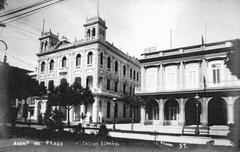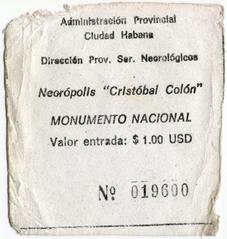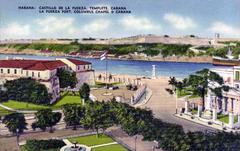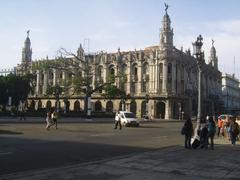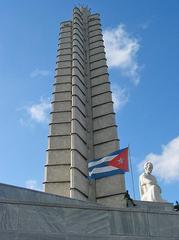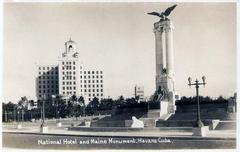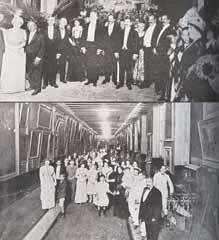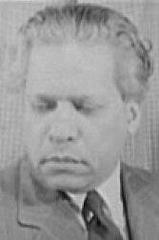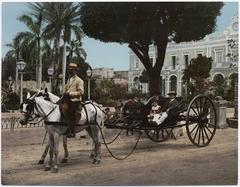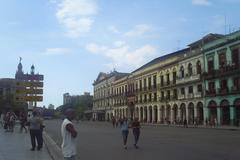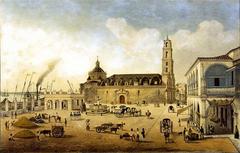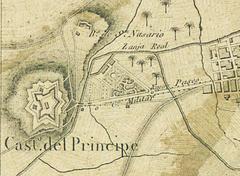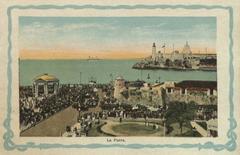Visiting the Embassy of Germany in Havana, Cuba: Visiting Hours, Tickets, and Travel Tips
Date: 04/07/2025
Introduction: The Embassy’s Role and Significance
The German Embassy in Havana is a cornerstone of diplomatic, economic, and cultural engagement between Germany and Cuba. Rooted in a diplomatic history that stretches back to the 19th century, the embassy has witnessed and adapted to seismic political shifts, including the Cold War and German reunification. Today, situated in Havana’s dynamic Vedado district, the embassy not only provides essential consular services—ranging from visa processing to emergency support—but also promotes cultural diplomacy, German language education, and academic exchange in partnership with institutions like the Goethe-Institut and DAAD.
Visitors can expect an efficient, secure, and accessible environment, with clear visiting hours, appointment systems, and dedicated support for both German and Cuban citizens. This comprehensive guide brings together the embassy’s historical context, visiting details, consular services, and cultural engagement to help you prepare for your visit and understand the embassy’s pivotal role. For the latest updates, always refer to the official German Embassy Havana website and explore further insights on Germany-Cuba relations (Embassies.info).
Contents
- Origins and Evolution of the German Embassy in Havana
- Key Milestones in Germany-Cuba Relations
- Visiting the German Embassy: Hours, Appointments, and Access
- Consular Services
- Travel and Visitor Tips
- Political, Economic, and Cultural Significance
- Location and Contact Information
- Security, Entry, and Accessibility
- Frequently Asked Questions (FAQ)
- Cultural and Educational Engagement
- Community Outreach and Bilateral Cooperation
- Practical Visitor Tips
- Nearby Amenities and Health & Safety
- Special Events
- El Morro Castle Visiting Guide
- Summary and Next Steps
- Sources
1. History and Evolution of the German Embassy in Havana
Early Diplomatic Relations
Germany’s presence in Cuba dates to the late 19th and early 20th centuries, when consular offices in Havana supported growing trade and protected German nationals. The embassy’s modern significance is closely linked to the dramatic political changes of the 20th century.
Cold War Dynamics
After the Cuban Revolution in 1959, Cuba established strong ties with Eastern Bloc nations. In 1963, diplomatic relations were formalized with East Germany (GDR), resulting in active exchanges in education and trade. By contrast, West Germany (FRG) did not have official relations with Cuba until after reunification.
Post-Reunification: The Modern Embassy
Following German reunification in 1990, diplomatic relations with Cuba normalized. High-level visits in the early 2000s—including those by German ministers—helped solidify bilateral cooperation. The embassy’s current location in Vedado is led by Ambassador Dr. Peter Rudolf Scholz as of July 2025.
2. Key Milestones in Germany-Cuba Relations
- 2015: German Foreign Minister Frank-Walter Steinmeier’s historic visit led to new cooperation agreements and a fresh human rights dialogue.
- 2018: Opening of a German trade and investment office in Havana, focusing on renewable energy and environmental projects.
3. Visiting the German Embassy in Havana
Embassy Location
Address: Calle 13 No. 652, entre B y C, Vedado, Plaza de la Revolución, La Habana, Cuba
Vedado is a central, vibrant district with wide avenues and early 20th-century architecture, close to the Malecón and major hotels. The embassy is about 5 km from Old Havana and 20 km from José Martí International Airport. Taxis or private car services are recommended due to limited public transport.

Visiting Hours
- Consular Section: Monday to Friday, 9:00 AM – 12:00 PM (closed on Cuban and German holidays)
- General Inquiries & Document Collection: Monday to Friday, 2:00 PM – 4:00 PM
Opening hours may vary by season; confirm current hours through the Embassy Holidays calendar.
Appointment Booking
All consular services require a prior appointment. Book online via the official system or contact the embassy by phone or email. Walk-ins are only accepted in emergencies.
Ticketing and Access
The embassy does not operate as a tourist attraction. There are no tickets or guided tours. Visitors for cultural events or language programs should contact the Goethe-Institut liaison office within the embassy.
Accessibility
The embassy is accessible to visitors with disabilities, with ramps and accessible restrooms. Notify staff in advance if you need assistance.
4. Consular Services
- Visas: Schengen (short-stay) and national (long-stay); visa requirements
- Passport Services: Renewal or replacement for German citizens
- Legal and Medical Assistance: For German nationals in emergencies
- Notarial and Legalization Services: Certification of signatures and legalization of Cuban documents for use in Germany
- Registration and Voting: For Germans residing in Cuba
Visit the official embassy site for detailed guidance.
5. Travel and Visitor Tips
Required Documents
- Valid passport (minimum six months validity)
- Completed application forms (downloadable online)
- Supporting documents (e.g., invitation letters, proof of insurance)
- Appointment confirmation
Payment Methods
Consular fees are usually payable in cash (euros or Cuban pesos). Credit/debit cards are rarely accepted.
Dress Code & Etiquette
Smart casual attire is recommended. Show respect for the diplomatic environment.
Waiting Times & Processing
Appointments fill quickly during peak periods. Visa processing generally takes 10–15 working days (Germany Visa Application Process).
Emergency Services
24/7 consular support is available for urgent situations such as loss of passport, arrest, or medical emergencies.
6. Political, Economic, and Cultural Significance
The embassy is a hub for dialogue on human rights, sustainable development, and modest but growing trade. In 2024, approximately 65,000 German tourists visited Cuba, highlighting bilateral tourism ties.
Cultural exchange is fostered through the Goethe-Institut and DAAD, supporting language promotion and academic collaboration.
7. Security, Entry, and Accessibility
- Security Checks: ID and appointment confirmation required; all visitors are screened.
- Prohibited Items: Large bags, sharp objects, and cameras (unless authorized).
- Arrival: Arrive 15 minutes early; expect to switch off or temporarily surrender electronic devices.
- Accessibility: Ramps and accessible restrooms are available.
8. Language Services
Primary languages are German and Spanish. English assistance is often available; request language support when booking your appointment.
9. Practical Visitor Tips
- Appointments: Essential for most services—book early, especially before holidays.
- Documentation: Bring originals and copies of all documents.
- Public Holidays: Embassy observes both German and Cuban holidays.
- Nearby Attractions: Vedado features hotels, restaurants, and cultural sites for a pleasant visit.
10. Health and Safety
- COVID-19 Protocols: May include mask-wearing and social distancing; check current embassy guidance.
- Travel Insurance: Required for Cuba and often for visa applications (Cuba Travel Tips).
11. Cultural and Educational Engagement
- Cultural Diplomacy: Embassy collaborates with the Goethe-Institut, organizing exhibitions, concerts, and film screenings.
- Educational Programs: Information and support for university programs and scholarships (DAAD Cuba).
- Language Promotion: German language courses via local partners.
- Youth & Academic Exchanges: Support for Cuban students and professionals visiting Germany.
12. Community Outreach and Bilateral Cooperation
The embassy supports the German community in Cuba with gatherings and travel advice, and fosters partnerships in education, science, and the arts.
13. Frequently Asked Questions (FAQ)
Q: What are the embassy’s opening hours?
A: Monday to Friday, 9:00 AM to 12:00 PM for consular services; 2:00 PM to 4:00 PM for general inquiries. Confirm hours before visiting.
Q: How do I book an appointment?
A: Via the embassy’s website or by calling/emailing the consular section.
Q: What documents are required for a visa?
A: Completed application form, valid passport, proof of accommodation, insurance, and financial means. Check specific requirements for your visa type.
Q: Are credit cards accepted?
A: No; pay fees in cash (euros or CUP).
Q: Is the embassy accessible?
A: Yes; facilities support visitors with disabilities. Notify staff in advance if you require assistance.
14. Nearby Amenities and Transportation
- Hotels: Hotel Nacional de Cuba, Hotel Capri
- Restaurants: Variety of Cuban and international options
- Transport: Taxis, limited public buses, car rental (Cuba Travel Tips)
15. Special Events and Cultural Activities
The embassy occasionally hosts or supports cultural events—follow their website and social media for announcements.
16. El Morro Castle Visiting Guide: Hours, Tickets, and Tips
Introduction
El Morro Castle, a 16th-century fortress guarding the entrance to Havana Bay, is a top historical site.
Visiting Hours
Open daily from 9:00 AM to 5:00 PM; last entry at 4:30 PM.
Tickets
Approx. 10 CUC for international tourists; discounts for locals, students, and seniors. Purchase at the entrance or via official platforms.
Getting There
Located at the bay entrance, accessible by taxi or classic car; near the Malecón.
Highlights
Explore battlements, cannons, lighthouse, and a maritime museum. Guided tours and panoramic views are available.
Visitor Tips
- Wear comfortable shoes
- Bring water, sun protection, and cash
- Check weather conditions
Nearby Attractions
La Cabaña Fortress, Old Havana, and various cafés and shops.
Events & Tours
Check for cultural events and guided tours in Spanish, English, or German.
For comprehensive travel planning, see Germany Visa.
17. Summary and Final Thoughts
The Embassy of Germany in Havana is more than a diplomatic post—it’s a bridge between nations, supporting travelers, fostering cultural and academic exchange, and deepening bilateral cooperation. Plan your visit by confirming hours, booking appointments, and preparing your documents. Stay informed via the embassy’s official website and social media, and consider using the Audiala app for real-time updates and travel support.
Sources and Official Links
- German Embassy Havana Official Website
- Embassies.info: Embassy of Germany in Havana
- German Federal Foreign Office FAQ
- Germany Visa Application Process
- Cuba Travel Tips
- DAAD Cuba
- Visa Requirements Cuba-Germany
